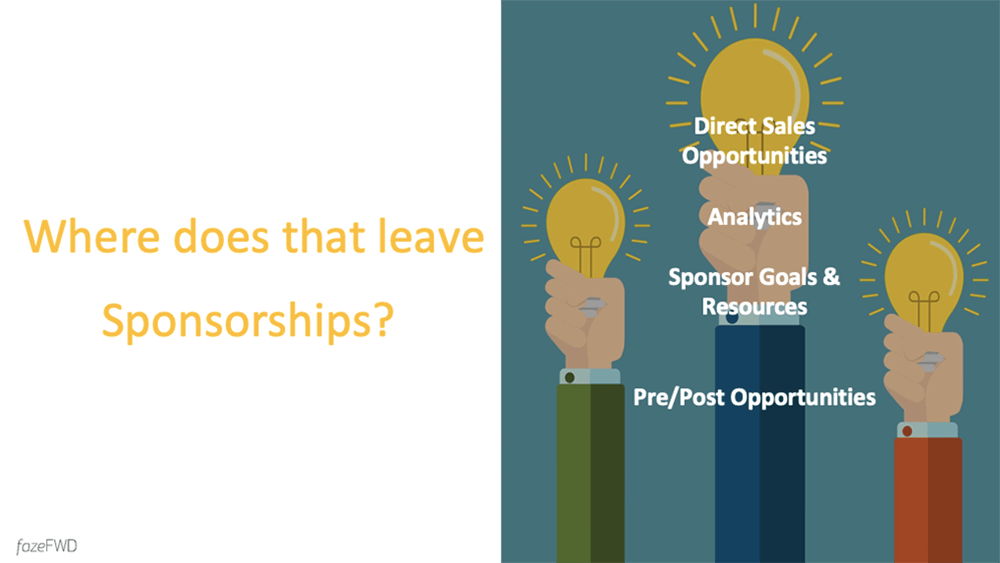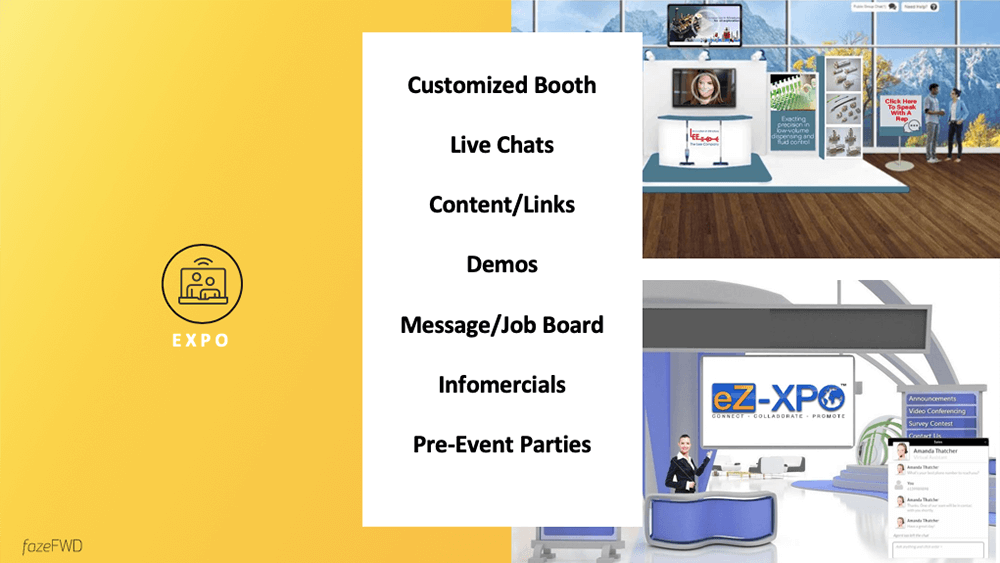
Robust content will both engage a virtual event audience and attract sponsors with a variety of opportunities, said Meg Fasy of fazeFWD Sponsorship Marketing during her session at the recent PlanetIMEX virtual event. (Slides courtesy Meg Fasy)
Planners have readjusted their revenue expectations for 2021, and not in a good way. The results of the October Convene COVID-19 Dashboard Recovery survey reveal that 13 percent of planners expect the negative financial impact on their 2021 events to be 75 percent or greater, nearly double the 7 percent who estimated a loss in that range in September.
Those downward projections not only indicate a growing realization that the pandemic will not be quelled as soon as had been hoped, they illustrate how challenging it is to rework the traditional revenue-generating model for face-to-face conventions for the virtual environment. Organizers continue to struggle to find their financial footing in virtual events — there’s uncertainty about what to charge registrants and how to find ways to provide sponsors value so they will participate in virtual events with their dollars.

Meg Fasy
That’s because we’re still relatively new to the world of hosting virtual events, Meg Fasy, principal of fazeFWD Sponsorship Marketing, pointed out in a session at IMEX Group’s second edition of its PlanetIMEX virtual event, Oct. 12-16. In her “Digital Sponsorship Possibilities” session, Fasy added that digital events have been around for years, but March marked the point when the industry as a whole was forced by the coronavirus crisis to move to online platforms. “There’s a lot of sponsor reluctance about virtual,” Fasy said. “We are programmed to be face-to-face.”
In her 30-minute session, Fasy tackled how to overcome that reluctance with a sponsorship strategy that leverages online opportunities, such as:
Focus on Content
In the virtual world, “repurposing content is an unbelievably smart way to drive revenue. You can slice and dice content so many different ways,” Fasy said, “that it’s just kind of a no-brainer and great opportunity.”
The event has to have “robust content,” she added, and available in different formats such as lightning rounds, birds-of-a-feather sessions, and roundtables — to both engage the audience and attract sponsors with a variety of opportunities.
Analytics
“Analytics are so important and we’re not quite there yet. We need to provide better and more analytics to our sponsors to give them the ROI they need,” Fasy said. The metrics that can be provided include: attendance/login, click-thrus, types of meetings held, live-session attendance, hours of video content consumed, pages viewed, resources downloaded, number/variety of chats, sponsor interactions, time spent in booths, completed searches, evaluations completed, and social-media buzz.
These are Important data points for sponsors, Fasy said, and “organizations that are able to capture this and provide it to their sponsors are going to do the best from a revenue point of view.” She also said that sponsors are especially interested in attendee lists and planners should explore opportunities to offer attendee information that don’t cross any privacy lines.
Growing Audiences
We’ve been able to attract two to three times the number of participants with digital events, Fasy said. And when face-to-face events resume, “we’re expecting attendee growth to skyrocket,” she said, now that we’ve experienced how digital events grow audiences. By way of example, Fasy said that companies can send two staff as they’ve done in the past to a convention while having their entire team participate online.

The move to digital events brings new opportunities for sponsorships, especially before and after the event.
Changing Consumption Patterns
Content is being delivered in more of a broadcast news kind of consumption, Fasy said. “Pre- and post-event opportunities are some of the best things to come out of virtual,” Fasy said. “We’re seeing approximately that 30-35 percent of attendees are going back after the virtual event to consume content.” When asked about podcasting in the Q&A portion of her session, Fasy noted that podcasts are an ideal pre- and post-event opportunity for sponsorship.
When it comes to what kinds of opportunities you can offer potential sponsors, Fasy said you should consider what category the sponsor falls into: branding, expo, or experiential.
Branding — These are sponsors who want their name front and center, so the following digital opportunities would be a good fit:
- Banners
- Pop-up ads and banners (which include a call to action)
- Direct messaging
- Speaker backgrounds
- Surveys
- Countdown clocks
- Community board
- Transition slides from breakout to breakout
- Lower thirds
- Commercials (30-60-second commercial prior to keynote or breakout)
- Micro-sites
- Digital live scribing with outline content of session
- Swag room — giving participants a link to pick out what items they’d like shipped to their home.
Expo — Fasy admitted that “platforms are not my forte,” but said that expo sponsors can also be tiered (i.e., bronze, silver, gold) with different level opportunities, starting with being included in a digital directory. This directory could include brand logos and links to their sites.
The second level could be a 2-D platform, where users can click on links and go to booths and live chats. And at the high end, you could offer a 3-D platform, complete with avatars.
It’s harder to sell expo clients on virtual platforms, Fasy said, because they are trained in face-to-face opportunities, where they can pull someone from the show floor into the booth to share their product or service. But that’s what’s known as a cold lead, she said. The virtual space can be more targeted. When a participant clicks on a link to learn more about a sponsor, she said, that’s a “warm lead.”
Options for expo sponsors include:
- Information/help desk
- Banner
- Expert bar
- Theater
- Customized booth and more (see photo below)

Some options for expo sponsors include customized booth, live chats, content/ links, demos, message/job board, infomercials, and pre-event parties.
Experiential — For those sponsors who are more focused on interactive experiences, Fasy recommended offering these options:
- Peer-to-peer chats
- Social-media events
- Contests
- Happy hours
- Live music
- Streaming parties
- Live competitions
- Cooking demos/tastings
- Meal delivery
- Snack breaks
- Games
- Give-back initiatives
- Health and wellbeing aspects, such as chair yoga, 10-minute meditation sessions, walks and morning runs
Michelle Russell is editor in chief of Convene.
